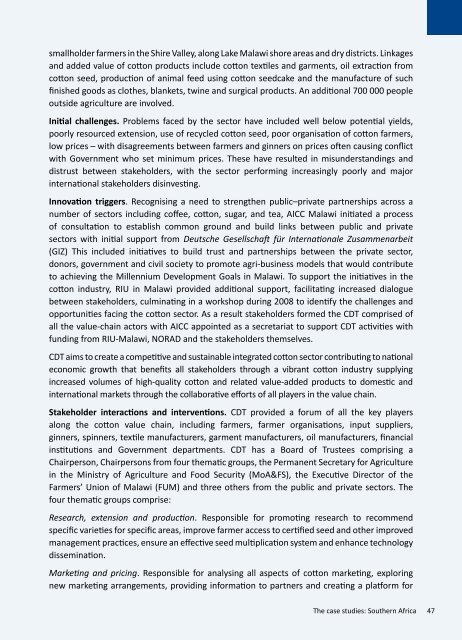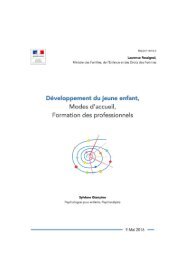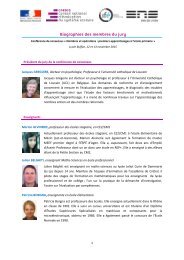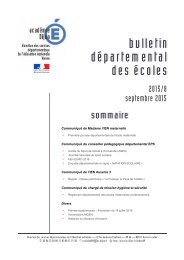agrl_innovations_in_ssa.pdf?utm_content=buffercb41d&utm_medium=social&utm_source=twitter
agrl_innovations_in_ssa.pdf?utm_content=buffercb41d&utm_medium=social&utm_source=twitter
agrl_innovations_in_ssa.pdf?utm_content=buffercb41d&utm_medium=social&utm_source=twitter
Create successful ePaper yourself
Turn your PDF publications into a flip-book with our unique Google optimized e-Paper software.
smallholder farmers <strong>in</strong> the Shire Valley, along Lake Malawi shore areas and dry districts. L<strong>in</strong>kages<br />
and added value of cotton products <strong>in</strong>clude cotton textiles and garments, oil extraction from<br />
cotton seed, production of animal feed us<strong>in</strong>g cotton seedcake and the manufacture of such<br />
f<strong>in</strong>ished goods as clothes, blankets, tw<strong>in</strong>e and surgical products. An additional 700 000 people<br />
outside agriculture are <strong>in</strong>volved.<br />
Initial challenges. Problems faced by the sector have <strong>in</strong>cluded well below potential yields,<br />
poorly resourced extension, use of recycled cotton seed, poor organisation of cotton farmers,<br />
low prices – with disagreements between farmers and g<strong>in</strong>ners on prices often caus<strong>in</strong>g conflict<br />
with Government who set m<strong>in</strong>imum prices. These have resulted <strong>in</strong> misunderstand<strong>in</strong>gs and<br />
distrust between stakeholders, with the sector perform<strong>in</strong>g <strong>in</strong>creas<strong>in</strong>gly poorly and major<br />
<strong>in</strong>ternational stakeholders dis<strong>in</strong>vest<strong>in</strong>g.<br />
Innovation triggers. Recognis<strong>in</strong>g a need to strengthen public–private partnerships across a<br />
number of sectors <strong>in</strong>clud<strong>in</strong>g coffee, cotton, sugar, and tea, AICC Malawi <strong>in</strong>itiated a process<br />
of consultation to establish common ground and build l<strong>in</strong>ks between public and private<br />
sectors with <strong>in</strong>itial support from Deutsche Gesellschaft für Internationale Zusammenarbeit<br />
(GIZ) This <strong>in</strong>cluded <strong>in</strong>itiatives to build trust and partnerships between the private sector,<br />
donors, government and civil society to promote agri-bus<strong>in</strong>ess models that would contribute<br />
to achiev<strong>in</strong>g the Millennium Development Goals <strong>in</strong> Malawi. To support the <strong>in</strong>itiatives <strong>in</strong> the<br />
cotton <strong>in</strong>dustry, RIU <strong>in</strong> Malawi provided additional support, facilitat<strong>in</strong>g <strong>in</strong>creased dialogue<br />
between stakeholders, culm<strong>in</strong>at<strong>in</strong>g <strong>in</strong> a workshop dur<strong>in</strong>g 2008 to identify the challenges and<br />
opportunities fac<strong>in</strong>g the cotton sector. As a result stakeholders formed the CDT comprised of<br />
all the value-cha<strong>in</strong> actors with AICC appo<strong>in</strong>ted as a secretariat to support CDT activities with<br />
fund<strong>in</strong>g from RIU-Malawi, NORAD and the stakeholders themselves.<br />
CDT aims to create a competitive and susta<strong>in</strong>able <strong>in</strong>tegrated cotton sector contribut<strong>in</strong>g to national<br />
economic growth that benefits all stakeholders through a vibrant cotton <strong>in</strong>dustry supply<strong>in</strong>g<br />
<strong>in</strong>creased volumes of high-quality cotton and related value-added products to domestic and<br />
<strong>in</strong>ternational markets through the collaborative efforts of all players <strong>in</strong> the value cha<strong>in</strong>.<br />
Stakeholder <strong>in</strong>teractions and <strong>in</strong>terventions. CDT provided a forum of all the key players<br />
along the cotton value cha<strong>in</strong>, <strong>in</strong>clud<strong>in</strong>g farmers, farmer organisations, <strong>in</strong>put suppliers,<br />
g<strong>in</strong>ners, sp<strong>in</strong>ners, textile manufacturers, garment manufacturers, oil manufacturers, f<strong>in</strong>ancial<br />
<strong>in</strong>stitutions and Government departments. CDT has a Board of Trustees compris<strong>in</strong>g a<br />
Chairperson, Chairpersons from four thematic groups, the Permanent Secretary for Agriculture<br />
<strong>in</strong> the M<strong>in</strong>istry of Agriculture and Food Security (MoA&FS), the Executive Director of the<br />
Farmers’ Union of Malawi (FUM) and three others from the public and private sectors. The<br />
four thematic groups comprise:<br />
Research, extension and production. Responsible for promot<strong>in</strong>g research to recommend<br />
specific varieties for specific areas, improve farmer access to certified seed and other improved<br />
management practices, ensure an effective seed multiplication system and enhance technology<br />
dissem<strong>in</strong>ation.<br />
Market<strong>in</strong>g and pric<strong>in</strong>g. Responsible for analys<strong>in</strong>g all aspects of cotton market<strong>in</strong>g, explor<strong>in</strong>g<br />
new market<strong>in</strong>g arrangements, provid<strong>in</strong>g <strong>in</strong>formation to partners and creat<strong>in</strong>g a platform for<br />
The case studies: Southern Africa 47






